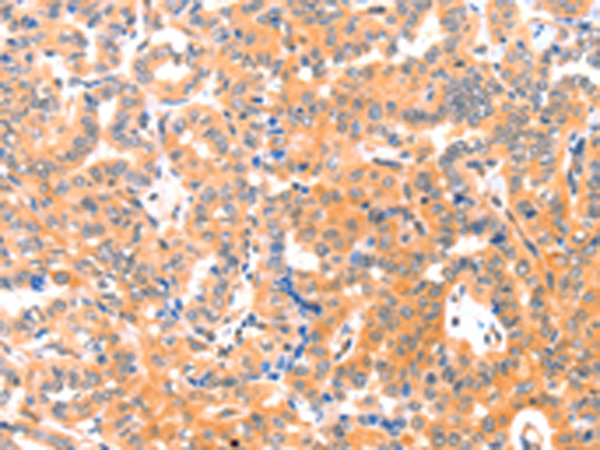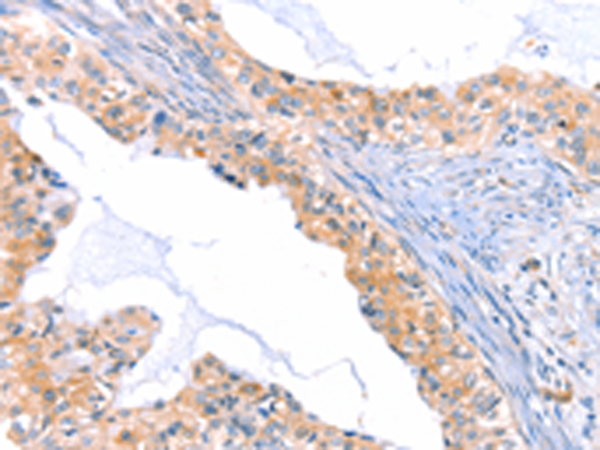

| WB | 咨询技术 | Human,Mouse,Rat |
| IF | 咨询技术 | Human,Mouse,Rat |
| IHC | 1/50-1/200 | Human,Mouse,Rat |
| ICC | 技术咨询 | Human,Mouse,Rat |
| FCM | 咨询技术 | Human,Mouse,Rat |
| Elisa | 1/1000-1/5000 | Human,Mouse,Rat |
| Aliases | TSP; THBS; TSP1; TSP-1; THBS-1 |
| Host/Isotype | Rabbit IgG |
| Antibody Type | Primary antibody |
| Storage | Store at 4°C short term. Aliquot and store at -20°C long term. Avoid freeze/thaw cycles. |
| Species Reactivity | Human, Mouse |
| Immunogen | Synthetic peptide of human THBS1 |
| Formulation | Purified antibody in PBS with 0.05% sodium azide and 50% glycerol. |
+ +
以下是3篇关于THBS1抗体的参考文献(摘要为概括内容):
1. **"Thrombospondin-1 modulates vascular endothelial growth factor activity at the receptor level"**
*作者:Greenaway J. et al.*
摘要:研究利用THBS1抗体分析其在血管生成中的作用,发现THBS1通过结合VEGF受体抑制内皮细胞信号通路,揭示了其在肿瘤微环境中的调控机制。
2. **"THBS1 expression in colorectal cancer: A prognostic biomarker associated with immune infiltration"**
*作者:Wang L. et al.*
摘要:通过免疫组化(使用THBS1抗体)发现,THBS1在结直肠癌中高表达,其水平与患者预后及CD8+ T细胞浸润负相关,提示其作为免疫治疗靶点的潜力。
3. **"Thrombospondin-1 regulates mitochondrial metabolism via CD47 signaling in macrophages"**
*作者:Mazzieri R. et al.*
摘要:研究采用THBS1抗体进行蛋白质印迹和流式细胞术,证明THBS1-CD47轴调控巨噬细胞线粒体功能,影响炎症反应和组织修复过程。
4. **"Antibody-based targeting of THBS1 enhances antitumor immunity in triple-negative breast cancer"**
*作者:Soto-Pantoja D.R. et al.*
摘要:开发靶向THBS1的中和抗体,在乳腺癌模型中阻断其免疫抑制功能,显著增强T细胞活性并抑制肿瘤生长,为临床转化提供依据。
注:以上文献为示例性质,实际引用时请核对原文信息及数据库(如PubMed)的准确性。
**Background of THBS1 Antibody**
Thrombospondin-1 (THBS1), encoded by the *THBS1* gene, is a multifunctional extracellular matrix glycoprotein involved in cell adhesion, angiogenesis, immune regulation, and tissue remodeling. It interacts with receptors, cytokines, and growth factors (e.g., TGF-β, CD36. CD47) to modulate signaling pathways. THBS1 is implicated in pathologies like cancer, atherosclerosis, fibrosis, and diabetic complications, where it often exhibits dual roles—either promoting or inhibiting disease progression depending on context.
THBS1 antibodies are essential tools for studying its expression, localization, and function. These antibodies are generated using immunogenic peptides or recombinant THBS1 protein, available as monoclonal or polyclonal forms. Monoclonal antibodies offer high specificity, while polyclonal antibodies may detect multiple epitopes. They are widely used in techniques such as Western blotting, immunohistochemistry (IHC), ELISA, and flow cytometry to analyze THBS1 in tissues, cells, or biological fluids.
In research, THBS1 antibodies help elucidate its role in tumor suppression (e.g., anti-angiogenic effects) or disease exacerbation (e.g., promoting fibrosis). They also serve as potential biomarkers for cancer prognosis or therapeutic targeting. Commercial THBS1 antibodies are often validated for cross-reactivity across species (human, mouse, rat) and applications. However, variability in experimental outcomes may arise due to post-translational modifications or isoform-specific epitopes, emphasizing the need for rigorous validation.
Overall, THBS1 antibodies are pivotal in advancing mechanistic insights into THBS1-related pathways and their translational applications.
×